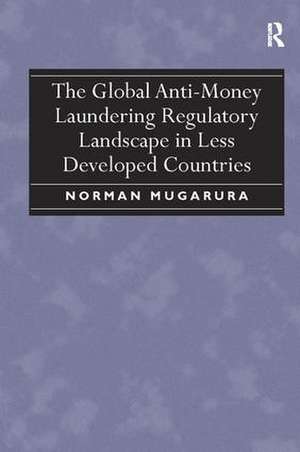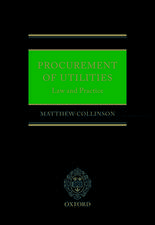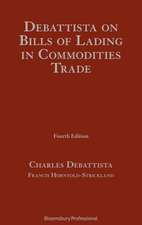The Global Anti-Money Laundering Regulatory Landscape in Less Developed Countries
Autor Norman Mugaruraen Limba Engleză Paperback – 22 mai 2017
| Toate formatele și edițiile | Preț | Express |
|---|---|---|
| Paperback (1) | 416.22 lei 6-8 săpt. | |
| Taylor & Francis – 22 mai 2017 | 416.22 lei 6-8 săpt. | |
| Hardback (1) | 1064.98 lei 6-8 săpt. | |
| Taylor & Francis – 28 iun 2012 | 1064.98 lei 6-8 săpt. |
Preț: 416.22 lei
Nou
Puncte Express: 624
Preț estimativ în valută:
79.65€ • 82.62$ • 66.41£
79.65€ • 82.62$ • 66.41£
Carte tipărită la comandă
Livrare economică 27 martie-10 aprilie
Preluare comenzi: 021 569.72.76
Specificații
ISBN-13: 9781138110052
ISBN-10: 1138110051
Pagini: 336
Dimensiuni: 156 x 234 x 18 mm
Greutate: 0.45 kg
Ediția:1
Editura: Taylor & Francis
Colecția Routledge
Locul publicării:Oxford, United Kingdom
ISBN-10: 1138110051
Pagini: 336
Dimensiuni: 156 x 234 x 18 mm
Greutate: 0.45 kg
Ediția:1
Editura: Taylor & Francis
Colecția Routledge
Locul publicării:Oxford, United Kingdom
Cuprins
Contents: Foreword; Preface; The conceptualization of money laundering offences and typologies; The dynamics of globalization and money laundering; The global anti-money laundering/countering the financing of terrorism framework; The evolution of a global anti-money laundering paradigm; Corruption and the domestication of global anti-money laundering regimes; Challenges to the localization of global anti-money laundering standards in less developed economies; Harmonization of global anti-money laundering laws; The proposed reforms to transpose global anti-money laundering regimes into the local economy; A glimpse into law and global markets; Conclusion; Appendices; Bibliography; Index.
Notă biografică
Norman Mugarura is senior law tutor at 'The Law Tutor Limited' London. He has previously taught commercial law in Universities and Private Colleges in London.
Recenzii
'Norman Mugarura has produced a fascinating and thought provoking discussion of the relationship between anti-money laundering regimes and emerging economies. I am happy to recommend the book.' Nic Ryder, University of the West of England, UK 'This is an important and timely book. Money laundering has become a global industry and a global problem. This book examines the difficult and often conflicting issues that arise in this area and comes up with a number of highly original and insightful new responses.' George Walker, Queen Mary University of London, UK 'This book is a thoughtful attempt to examine the relevant laws relating to the identification and interdiction of tainted wealth in a dynamic context with a particular and focused perspective from developing economies. It provides an informed account of the law, primarily in the United Kingdom, across a broad spectrum of issues. The author's essentially intellectual analysis is both timely and unique.' Barry Rider, Bryan Cave LLP, UK
Descriere
Examining the challenges of using the global anti-money laundering (AML) framework in an uneven global regulatory landscape, this book discusses the difficulties of relating de-regulation, liberalization and conflict of laws to the dynamics of the market economy and demonstrates how the global environment engenders money laundering. It suggests that corruption, general systemic failure and lack of infrastructural capacity in some developing economies are hampering the implementation of laws and regulations.








